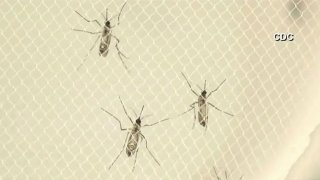
More mosquitoes carrying West Nile virus have been found in Mesquite, according to the Dallas County Health and Human Services Department.
The mosquito traps were collected Friday from the 75149 ZIP code in Mesquite, according to the DCHHS.
The Mesquite sample follows positive tests in two other Dallas-area ZIP codes, 75229 and 75216. After those positive tests, the city of Dallas sprayed for mosquitoes June 11 -- so far no further plans to spray have been announced.
"Right now, even though we still need to be concentrating on how to live safely with COVID-19, we cannot forget about West Nile Virus," Dr. Philip Huang, Director of DCHHS, said in a written statement. "As the summer heats up and more people are getting outside, remember the four Ds: Dress, Drain, Dusk/Dawn, and DEET."
Earlier this year in April, the city of Dallas also sprayed for mosquitoes in Cedar Hill after mosquito samples in the 75104 ZIP code tested positive. The positive mosquito sample in Cedar Hill was the first such test in Dallas County in 2020.
According to the county, West Nile prevalence tends to peak in early August and in warmer weather.
Last year, 199 mosquito traps tested positive for the West Nile virus, and 13 people became infected with the disease.
How to Protect Yourself From Mosquito Bites
- Dress in long sleeves, pants when outside: For extra protection, spray thin clothing with repellent.
- DEET: Make sure this ingredient is in your insect repellent.
- Drain standing water in your yard and neighborhood: Mosquitoes can develop in any water stagnant for more than three days.
It has been recommended in the past that to avoid mosquito bites you should avoid being outdoors during Dusk and Dawn (the 4 Ds). While this is true for mosquitoes that commonly carry the West Nile virus, other types of mosquitoes that are more likely to carry Zika, dengue and chikungunya are active during the day. When outdoors, no matter what time of day, adjust your dress accordingly and wear insect repellent containing DEET, picaridin or oil of lemon eucalyptus as your first line of defense against insect bites.

